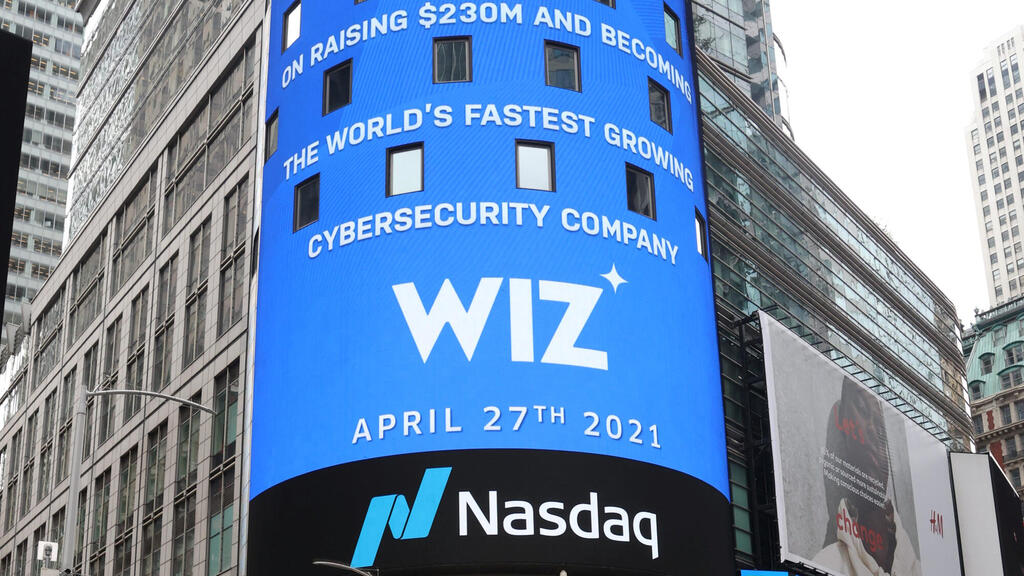If you operate in the business sector, you likely know the name Avi Hasson. A former chief scientist of Israel and chairman of the Israel Innovation Authority, Hasson now serves as CEO of Startup Nation Central.
Startup Nation Central, inspired by the bestselling book Start-up Nation, connects the Israeli high-tech industry with organizations and investors from around the world. Its database includes more than 6,000 high-tech companies operating in Israel.
Hasson tells Ynetnews' Hillel Fuld that he remains optimistic about Israel's tech sector, noting that periods of crisis in Israel have often spurred accelerated innovation. The current period — marked by the war in Gaza, fighting on multiple fronts and domestic unrest — is no exception, he asserts.
Avi Hasson has become a brand name. How did it all start? Bring me back to the beginning of your career.
"While I had the privilege of being the founding chair of the Israel Innovation Authority, my real school was Intelligence Unit 8200, where I first learned how to apply technology to solve complex challenges, as well as the benefits of radicalized bottom-up, collaborative innovation. After my military service, I spent years in the private sector, working in and with tech companies, gaining firsthand experience in what it takes to build and scale innovation, investing in Israeli startups and helping them grow into global players. Then, as chief scientist and head of the Israel Innovation Authority, I shaped policies and programs that strengthened the tech ecosystem, ensuring it remained competitive and globally connected. Now, at Startup Nation Central, I’m focused on ensuring Israeli innovation continues to lead in high-impact sectors.
'Historically, crisis periods in Israel have led to accelerated innovation'
"Looking back on my career, I admit that my passion has never been about any single product or company — it has always been about creating value that goes beyond the specific project, shaping an ecosystem where technology drives lasting economic and strategic impact.
Hasson says that tech continues to be Israel’s economic engine, reeling off economic indicators showing how strong the business scene is here.
Are you optimistic about Israel’s business sector? Why?
"Absolutely. The numbers tell the story. Israeli tech companies raised over $12 billion in 2024, marking a 27% year-over-year increase, outpacing both Europe and Asia. Despite the war, high-tech GDP grew by 2.2% from Q1 to Q3 2024, while the overall economy contracted by 1.5 %, proving that tech continues to be Israel’s economic engine. The Israeli tech index on NASDAQ rose 15.8 %, outperforming the NASDAQ 100’s 9.4 % increase, showing that global investors see Israeli innovation as a long-term bet, not just a short-term gamble. Even in difficult times, we see record numbers of acquisitions and multinational investments. The fundamentals of the ecosystem, entrepreneurial culture, deep tech expertise and global market focus remain strong. And if history is any guide, downturns lead to waves of innovation, and Israel is already ahead of the curve.
"Historically, crisis periods in Israel have led to accelerated innovation, and this time is no different. Investors, founders, and global partners understand that Israeli tech is a long-term asset, not a short-term risk."
What will be the biggest challenge facing Israeli tech over the next decade?
"The biggest challenge is transitioning from a startup-driven ecosystem to a scale-up economy. Startups are essential for innovation, but scale-ups drive GDP growth, employment and long-term economic stability. They generate more jobs, sustain local manufacturing and R&D and create industries rather than just exits. In 2024, 15 mega-rounds totaled $4 billion, nearly double 2023’s numbers, showing that more Israeli companies are maturing into global players. But Israel needs more than just bigger companies. It needs new sectors to anchor the economy.
"For years, cybersecurity has been Israel’s flagship industry, and while it remains a pillar of strength, the 'next cyber' must emerge. Health tech is a strong contender with Israel’s combination of top-tier medical research, AI expertise and a fully digitized healthcare system giving it a global edge. Climate tech, defense tech and AI are also sectors with massive potential. Scaling these industries will require long-term investment, government support and stronger ties between academia, industry, and global markets.
"Talent remains a critical factor. Scale-up growth will demand a broader and more diverse workforce, which means integrating underrepresented populations including ultra-Orthodox, Arab Israelis and women into the tech economy at higher rates. Without a deep and sustainable talent pipeline, Israel’s scale-up ambitions will be limited. The future of Israeli tech depends on not only scaling companies but building the next foundational industries that will sustain the economy for decades to come."
Where does Israel stand in the AI game? Are we falling behind or stepping up?
"We’re stepping up. AI has been part of Israeli tech for years, powering cybersecurity, fintech, and health tech, but now the game is changing. The biggest question is whether Israel will lead in foundational AI, not just applications, but in building the infrastructure, models and platforms that will shape the future. Early-stage AI investments are growing, and Israeli companies are at the forefront of AI-driven cybersecurity, enterprise solutions and medical innovation.
"To stay ahead, we need more compute power, data availability and large-scale AI companies. The U.S. and China have massive AI infrastructure investments, Israel must ensure it has the same foundation to remain competitive. The talent is here, the entrepreneurial culture is here, but we need smart policies, R&D infrastructure, investment incentives and global partnerships to maintain our edge.
How did the regional instability affect the ecosystem, if at all?
"October 7 was a shock, but Israeli tech is built for volatility. While 15% of the workforce was drafted and some startups struggled with funding gaps, the private funding landscape still grew by 27% year-over-year. M&A (mergers and acquisitions) activity surged, and multinational corporations increased their acquisition activity in Israel, showing strong confidence in the ecosystem. Cybersecurity and defense tech have seen record investor interest, reinforcing Israel’s role as a global leader in security innovation.
"At the same time, the impact has not been uniform across sectors. A cybersecurity startup with government and enterprise customers may be seeing a surge in demand, while an early-stage agrifood or climate tech startup facing supply chain disruptions and capital constraints is in a much tougher position. Travel bans and disruptions in air travel have further complicated business operations, delaying deals, slowing market expansion, and making it harder for startups to access global customers and investors. Young startups in certain sectors are struggling with delayed pilots, slower fundraising, and investor caution around longer time-to-market solutions."
"Defense tech is a natural extension of cyber, tackling state-sponsored attacks, battlefield tech and critical infrastructure protection"
Still, Hasson says he believes the Israeli tech sector remains determined to deliver no matter what. "Entrepreneurs are adapting, finding alternative routes to maintain momentum, and pushing forward with the same urgency and resilience that have always defined the ecosystem. The resilience is there, but the challenges are different depending on the sector, and some areas will need more targeted support to weather this period and grow beyond it," he says.
Israel has dominated the cyber world for decades. What will be Israel’s next sweet spot?
"Cyber is still core. Israeli cybersecurity funding is equal to over 40% of U.S. cybersecurity investments in 2024, and half of the world’s top 10 cyber firms were founded by Israelis, with seven maintaining R&D centers locally. But beyond cyber, we’re seeing major growth in defense tech, health tech, and climate tech. Defense tech is a natural extension of cyber, tackling state-sponsored attacks, battlefield tech and critical infrastructure protection. Health tech is a high-potential sector, with AI-driven medical solutions attracting global investment and Israeli startups developing cutting-edge technologies in diagnostics, personalized medicine and digital health. Climate tech is another high-potential sector, as global markets increasingly demand sustainable solutions, and Israel has the technology to deliver.
Tell me about Startup Nation Central, your mission, and how it’s evolved over the years.
Startup Nation Central connects global solution seekers with Israel’s fast-paced and bold approach to technology, which we have dubbed 'impatient innovation.' We provide frictionless access to the ecosystem through our Finder platform, partnerships and innovation diplomacy. Our focus has evolved from just connecting startups to scaling Israeli innovation into global impact. Today, we’re supporting scale-ups, forging international collaborations, and driving investment into strategic sectors like AI, climate tech, and health tech. The goal is simple: keep Israel at the forefront of global innovation and ensure our ecosystem continues to grow and lead."
‘Israel has always thrived on debate, but the stakes feel higher now. The tech sector remains a unifying force, bringing together people from all backgrounds to build solutions.’
Regarding Israel, how do you view Israeli society evolving, specifically as it pertains to the loaded topics and the internal strife?
"Israel has always thrived on debate, but the stakes feel higher now. Between judicial reform, the ultra-Orthodox workforce challenge and the war, we’re in a period of deep internal reflection. The tech sector remains a unifying force, bringing together people from all backgrounds to build solutions. Beyond business, high-tech companies and leaders have played an active role in broader national issues, stepping up in times of crisis, supporting civil initiatives, and shaping discussions on Israel’s economic and social future.
Get the Ynetnews app on your smartphone: Google Play: https://bit.ly/4eJ37pE | Apple App Store: https://bit.ly/3ZL7iNv
"If Israel wants long-term economic resilience, we must integrate more populations into the workforce, and tech is the best vehicle to do it. Keeping top talent in Israel is critical to maintaining our competitive edge and ensuring that Israel remains an attractive place for innovation, investment, and entrepreneurship. The more inclusive and broad-based the tech ecosystem becomes; the stronger Israel’s economy will be."
What can Israel do to maintain its position as a tech superpower on the global stage?
"Three things. One, invest in talent, Israel’s future competitiveness depends on expanding the talent pipeline and remaining the best place for global tech talent. Two, double down on deep tech, we need to lead in AI, quantum computing and synthetic biology, not just software. Three, strengthen global ties - innovation diplomacy is key, and Israel must continue leveraging partnerships to maintain its edge. The world looks to Israel for solutions to global challenges, and we need to ensure our tech ecosystem remains the go-to destination for impact-driven innovation."
Hasson encourages Israeli entrepreneurs to think globally from day one. He explains that Israeli startups "succeed when they solve big problems for big markets. The world doesn’t need another small, niche solution, it needs bold, scalable innovation."
He says the startups should build something that global investors and customers can’t ignore. "And don’t wait for permission, just go. Resilience, speed and global ambition separate the best from the rest. The companies that think big and act fast are the ones that will define the next generation of Israeli tech leaders," he concludes.
First published: 18:29, 03.25.25





